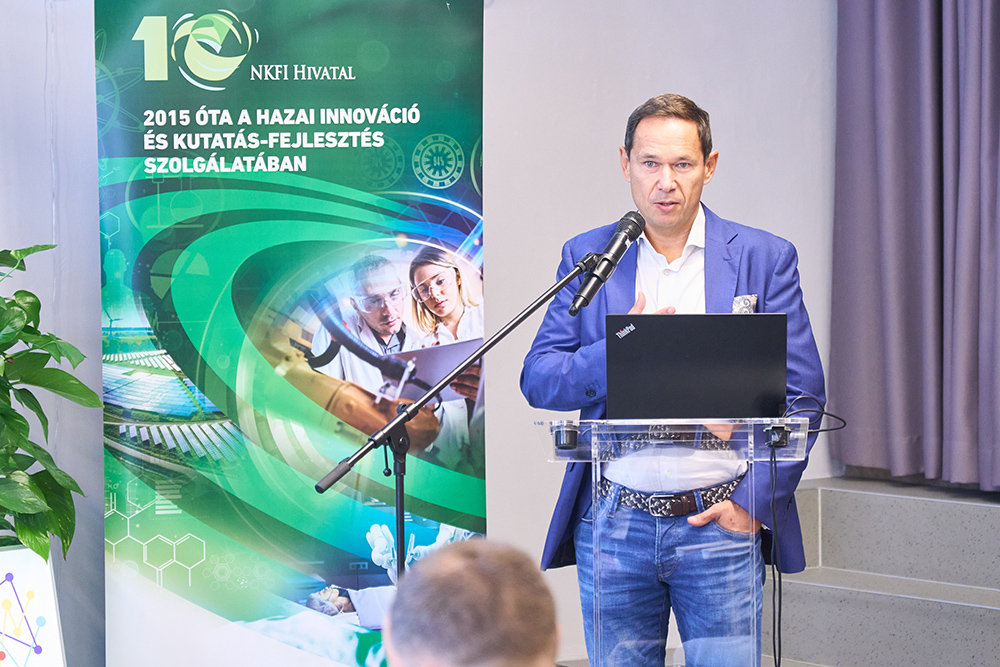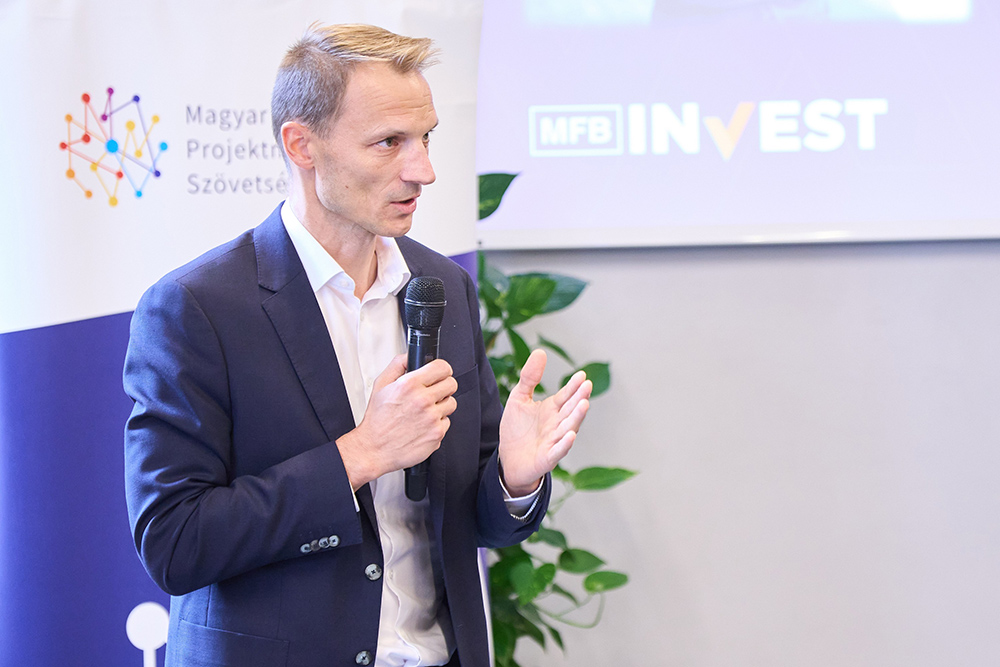The conference jointly organized by the NRDI Office and PMSZ was hosted at the impressive Budapest venue Create26 and formed an integral part of the large-scale Hungarian Innovation Week programme series held in Budapest between 10 and 19 September. The event, which attracted nearly 100 participants, was the third stop in the conference series celebrating the 10th anniversary of the NRDI Office. It focused on financing opportunities for domestic startups and innovative small and medium-sized enterprises (SMEs), changes in government funding schemes, trends in venture capital, corporate innovation attitudes and the challenges stemming from the shortage of talented new professionals, with the participation of renowned decision-makers and experts from the sector.
Government financing strategy and target groups
In his opening speech, László Bódis, Deputy State Secretary for Innovation at the Ministry of Culture and Innovation, outlined the latest changes to the government’s financing strategy. He highlighted three key target groups that both the state and private capital financing innovation should pay close attention to:
- strong Hungarian medium-sized enterprises seeking to enter international markets;
- micro and small enterprises focusing on digitalization and process development and innovating primarily to increase the efficiency of their existing processes, products and service;
- startups active in the technology and healthcare sectors that have typically been in business for no more than a few years but are targeting rapid international growth.
Under the EDIOP Plus programme, HUF 182 billion has recently been made available for digitalization and innovation, with an additional HUF 100 billion expected to be allocated by the end of 2025. This funding is in addition to existing venture capital and research grant opportunities. László Bódis emphasized that the government’s goal is to support startups and SMEs in increasing their global competitiveness, with a particular focus on deep tech and life sciences.
Trends in venture capital and financing gaps
Péter Tánczos, Managing Partner at Euroventures and board member of the Hungarian Venture Capital and Private Equity Association (HVCA) analysed the current trends in the venture capital market. Comparing them to Western European trends, he highlighted the funding boom led by Hiventures between 2019 and 2022, which focused on early-stage and seed-phase investments. This period significantly increased both the number and volume of small and early-stage investments in Hungary. However, this boom has had little lasting impact. While substantial public funds are still available today, direct state involvement remains overly dominant within these resources. Although co-financing schemes are on the rise, deal-by-deal co-investment structures are still lacking. New state-backed capital programmes are launching this year, partly under the Hiventures umbrella, which will support innovative companies through two funds with a total budget of HUF 18 billion.
According to Tánczos, there are critical funding gaps in the ranges below EUR 100,000 and between EUR 700,000 EUR 1.5 million. These financing amounts are essential for startups to launch and enter international markets, but are often too small for venture capital funds and too large for business angels, making them insufficiently attractive to both. In the case of scaleups seeking EUR 10–15 million or more, Hungarian companies often turn to foreign investors, as the room for manoeuvre of regional venture capitalists is limited due to high return expectations. Tánczos emphasized the importance of government incentives, without which equity financing for early-stage startups remains too risky for private investors.
Corporate Innovation Attitudes
Balázs Dobos, Head of the Innovation Division of Századvég Konjunktúrakutató Zrt., pointed out – based on their research findings – that only 30% of Hungarian companies consider product or service development important, while 60–70% aim to enter new markets without meaningful innovation. This contradiction needs to be resolved, as innovation is essential for gaining ground in modern markets. Shifting this mindset is a shared responsibility of all actors within the Hungarian innovation ecosystem. According to the research presented, 64% of Hungarian companies still rely primarily on their own resources for development, 12% apply for government funding, 3.7% use bank loans and only 1.8% consider equity financing. At the same time, in terms of raising financial awareness, there are already initiatives – both from policymakers and business chambers – that can significantly help Hungarian businesses to consider more complex financing solutions.
State-backed and market-based equity investments
Gábor Dénes, Chairman and CEO of MFB Invest Zrt., spoke about state-backed but market-driven equity investments, adding that MFB Invest manages HUF 2,800 billion through 55 funds, 80% of which has already been allocated. The organization is currently working on the creation of 20 new funds, in close collaboration with professional stakeholders. The Housing Equity Programme provides HUF 300 billion in funding to boost the construction industry and improve the housing situation. According to Dénes, given the size of the Hungarian market, 80 to 100 innovative small businesses per year qualify for smaller-scale equity investments, while larger investments in the range of EUR 1–2 million typically affect only 10 to 20 companies.
Startup financing and research talent development
The roundtable discussion at the conference was moderated by László Csíki, Director of Startups at the Hungarian Innovation Agency, its participants included László Hradszki (CEO of Hiventures Zrt.), Elemér Eszter (co-founder of Impact Ventures), Benjamin Berényi (co-founder of PastPay) and László Lengyel, Vice President for Science and International Affairs at the NRDI Office. According to Csíki, given the state of Hungary’s venture capital market, it is unrealistic to expect startups to be funded all the way to the “unicorn” stage (i.e. a valuation over USD 1 billion). He noted that Central and Eastern European (CEE) fund managers are significantly underrepresented in terms of capital raising, as fund managers operating in the region have only been able to raise 1.4–1.6% of total European capital over the past several years. Moreover, a significant portion of this (60–70%) is raised by buyout-focused funds, in other words, the level of early-stage venture capital financing is extremely low. Therefore, state involvement remains essential in financing early-stage innovative companies.
László Hradszki briefly introduced Hiventures’ new HUF 18 billion equity programme launching by the end of this year. The programme will operate through two separate funds: one focused on Budapest, and another targeting more developed regions of the country. Both funds will prioritize deep tech, Medtech, and AI startups, and, following EU de minimis rules, will offer investments up to EUR 300,000 per deal.
Elemér Eszter praised the market-oriented operations of the European Investment Fund (EIF), highlighting its “fund of funds” model as exemplary for the region. However, due to high return expectations, the Central European market remains less attractive to larger funds.
Benjamin Berényi, using PastPay as a case study, illustrated the critical role that state funding and Hiventures’ capital investment programmes play in the early life of a startup. These resources were vital to the company’s survival, though the bureaucratic and administrative burdens associated with them significantly hindered its growth.
László Lengyel highlighted the opportunities for talent management and recruitment, emphasizing that enhancing higher education and the research sector is crucial for ensuring a high-quality talent pool. Berényi also confirmed that multinational companies attract top talent with high salaries, making it difficult for startups to recruit agile, internationally competitive team members.
Hradszki stressed the importance of an active and broad angel investor community, citing Estonia as a positive example: despite its small population (1.37 million), it has a significantly larger number of active angel investors than Hungary. The discussion concluded that while Hungary has a strong knowledge base, building a robust innovation ecosystem will require decades of work for which conscious financial planning, smart support policies and the alignment of talent development efforts are essential.
This exchange of views also highlighted that the Hungarian innovation ecosystem, despite being grounded in a solid knowledge base, faces a number of challenges, including funding gaps, weak corporate innovation attitudes and a shortage of skilled professionals. To improve Hungary’s global competitiveness, it is crucial to strengthen state involvement, expand venture capital programmes and effectively channel early-stage innovation results into the capital markets.













